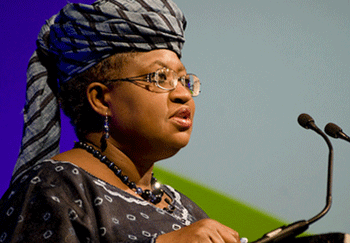The Federal Government on Monday said that it planned to reduce the recurrent expenditure by 65 per cent in 2015 to boost economic growth. Dr Ngozi Okonjo-Iweala, the Minister of Finance, who disclosed this at the Renaissance Capital Fourth Annual Pan-Africa Investor Conference in Lagos, said that the capital expenditure would also go down by 40 per cent.
Okonjo-Iweala said that the gains from the reduction would be redirected at critical areas of the economy to ensure economic growth and reduction in unemployment rate. “We are correcting our past fiscal lapses to achieve the desired result and we will continue to slide down on recurrent expenditure. The major challenge of the government is the rising unemployment rate currently at 23 per cent and all economic reforms are geared toward job creation,” she added.
Okonjo-Iweala, who is also the Coordinating Minister for the Economy, said that the government would reduce domestic debt in 2013 with the issuance of N100 billion redeemable bonds. According to Okonjo-Iweala, the economy has been growing at an average of seven per cent in the past decade in spite of the challenges. She said that plans were on to establish a development finance institution to provide long-term finance for businesses and strengthen economic growth.
Okonjo-Iweala commended Renaissance Capital for its confidence in Nigeria and Africa, adding that the company had brought in a lot of investors. Malam Sanusi Lamido Sanusi, the Governor, Central Bank of Nigeria (CBN), said that infrastructure inadequacies should be addressed to ensure economic growth. Sanusi said that the cost of production in Nigeria had remained high due to security challenges, lack of power and bad roads.
He said that the CBN would continue with its tight monetary policies, adding that the Monetary Policy Committee would not be in a haste to reduce the current rate. The CBN governor also called on the government to develop the non-oil sector of the economy to enable it depend less on oil revenue. Mrs Yvonne Ikeh, the Chief Executive Officer, Renaissance Capital, West Africa, said that Africa was experiencing a great revolution in terms of investment inflow. Ikeh said that Nigeria would lead the African revolution due to its various economic reforms.

